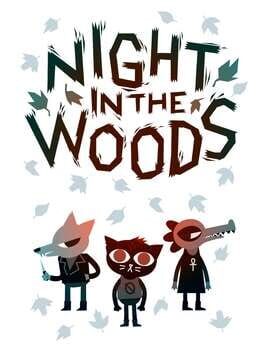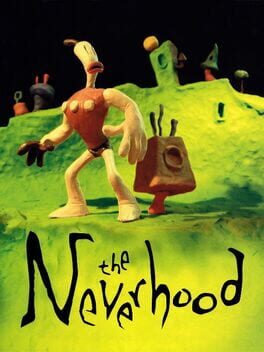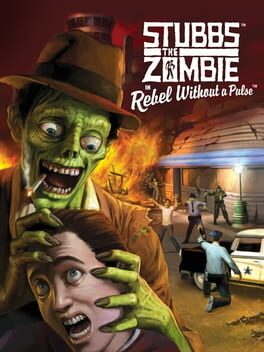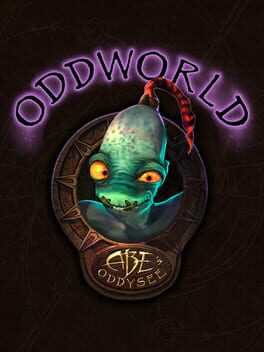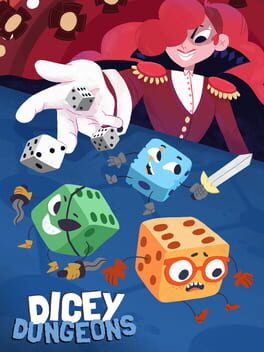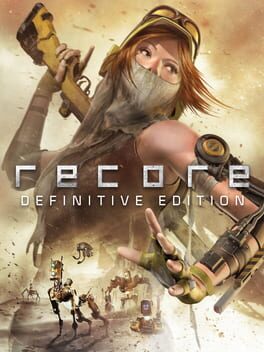NoBadKittens
Bio
I'm Maggie. I'm 34, an artist/author and I play pretty much everything I can, finances withstanding.
I'm Maggie. I'm 34, an artist/author and I play pretty much everything I can, finances withstanding.
Badges

Gamer
Played 250+ games

N00b
Played 100+ games

2 Years of Service
Being part of the Backloggd community for 2 years
Favorite Games
435
Total Games Played
000
Played in 2024
000
Games Backloggd
Recently Reviewed See More
The Evil Within 2 is the Terrifier 2 of video games.
Allow me to explain.
In both instances, the previous incarnations of these franchises were, at best, middling to downright awful. The first Terrifier film, and I say this as an independent artist who doesn't like criticizing people doing their best to make their work seen, is pretty bad. It's not even bad in a "so bad it's good" kind of way, it's just plain kinda bad. Aside from a few rather impressive practical visual effects, and a fantastic performance by David Howard Thornton as Art the Clown, it's an extemely low tier C budget (it's that bad, it's not even a B level movie) indie splatter horror one might've seen air in the mid 2000s late at night on some obscure cable channel.
The Evil Within is much the same way. The first game, while being relatively enjoyable to play and works pretty well mechanically - it's only saving grace, really - is so incoherent and convoluted that it borders on outright nonsense at times. Even by the end, when everything is explained and the DLC goes even further to shed light on things, it's still an absolute mess of a story. I do believe there was a way for them to tell that story in a far more palatable and comprehensible manner, especially seeing how they handled the story in the sequel, but alas, there's nothing we can do about that. The damage is done. In a lot of ways, it almost feels like the first game only exists as a way to explain the technology, Sebastians past and his ties to it all. But despite all its cons, the game is enjoyable. It's just got narrative dementia.
BUT, both sequels build on their predecessors so much that they completely validate the outright existence of them. Terrifier 2 managed to create an entire lore, not just for Art but for the lead girl, and tying them together, while The Evil Within managed to take what little thread of plot the first game had and weave it together in an actually believable (well, as believable as something so outlandish like this can be) way that makes it not feel like it's forced in any way. In a way it kind of reminds me of the narrative jump in quality between Portal and Portal 2. Valve somehow managed to take a game with relatively no plot and one joke, and turn its sequel into a surprisingly heartbreaking story with real stakes at play. The Evil Within 2 is doing the very same thing.
This is rare, by the way. It's not only rare for a sequel to outperform its original, but even rarer to truly validate the existence of an original that, by all standards, wasn't that great to begin with. I'm fully impressed, and The Evil Within 2 is easily one of my favorite games of all time, much like how Terrifier 2 is one of my favorite films of all time.
The Evil Within (both the first and the second) are also prime examples of transitions in gameplay. The first was released right at the cusp of the new gen of consoles, so it plays fairly old style. Linear, basic, straight forward. The second, however, released a few years later, knee deep in the next gens life cycle, fully embraces the new way people make games. It's open world, it's exploratory, and while it keeps the upgrade tree that was present in the previous, it feels like it matters this time around, and for once crafting doesn't feel like an afterthought or a burden. I've never seen such a rift in play style between two games in the same franchise released only a handful of years part. It's kind of wild.
But The Evil Within 2 is leagues above its predecessor, no question. The plot is actually understandable, and even engaging, making you genuinely want to see Sebastian succeed now, whereas before one couldn't really relate to his rather accidental inclusion in a story that wasn't even his own. On top of that, the gameplay feels better, and for once an open world isn't a detriment but an improvement. The game is also, and I rarely say this because frankly I don't care or find it important, absolutely gorgeous to look at, especially for 2017. The visuals are beautiful. And, perhaps I'm wrong here but...it feels like this game inspired a lot of other stuff, particularly Remedy's "Control", in regards to being set in essentially one large shape shifting world where hallways will change on a whim, just depending on what angle you're standing at. I don't think this game gets enough credit for really envisioning techniques now being used in a lot of other games.
The Evil Within 2, much like Terrifier 2, builds upon its prior incarnation to such a degree that the first now feels like it has a right, a reason even, to exist, even if that's merely just as set up for what comes next. Frankly, if there's never an Evil Within 3 (and I don't see a reason why there should be, narratively), then this was an incredible wrap up to something that started out rough as sandpaper, and that's worthy of applause in and of itself.
It's one hell of a ride.
Allow me to explain.
In both instances, the previous incarnations of these franchises were, at best, middling to downright awful. The first Terrifier film, and I say this as an independent artist who doesn't like criticizing people doing their best to make their work seen, is pretty bad. It's not even bad in a "so bad it's good" kind of way, it's just plain kinda bad. Aside from a few rather impressive practical visual effects, and a fantastic performance by David Howard Thornton as Art the Clown, it's an extemely low tier C budget (it's that bad, it's not even a B level movie) indie splatter horror one might've seen air in the mid 2000s late at night on some obscure cable channel.
The Evil Within is much the same way. The first game, while being relatively enjoyable to play and works pretty well mechanically - it's only saving grace, really - is so incoherent and convoluted that it borders on outright nonsense at times. Even by the end, when everything is explained and the DLC goes even further to shed light on things, it's still an absolute mess of a story. I do believe there was a way for them to tell that story in a far more palatable and comprehensible manner, especially seeing how they handled the story in the sequel, but alas, there's nothing we can do about that. The damage is done. In a lot of ways, it almost feels like the first game only exists as a way to explain the technology, Sebastians past and his ties to it all. But despite all its cons, the game is enjoyable. It's just got narrative dementia.
BUT, both sequels build on their predecessors so much that they completely validate the outright existence of them. Terrifier 2 managed to create an entire lore, not just for Art but for the lead girl, and tying them together, while The Evil Within managed to take what little thread of plot the first game had and weave it together in an actually believable (well, as believable as something so outlandish like this can be) way that makes it not feel like it's forced in any way. In a way it kind of reminds me of the narrative jump in quality between Portal and Portal 2. Valve somehow managed to take a game with relatively no plot and one joke, and turn its sequel into a surprisingly heartbreaking story with real stakes at play. The Evil Within 2 is doing the very same thing.
This is rare, by the way. It's not only rare for a sequel to outperform its original, but even rarer to truly validate the existence of an original that, by all standards, wasn't that great to begin with. I'm fully impressed, and The Evil Within 2 is easily one of my favorite games of all time, much like how Terrifier 2 is one of my favorite films of all time.
The Evil Within (both the first and the second) are also prime examples of transitions in gameplay. The first was released right at the cusp of the new gen of consoles, so it plays fairly old style. Linear, basic, straight forward. The second, however, released a few years later, knee deep in the next gens life cycle, fully embraces the new way people make games. It's open world, it's exploratory, and while it keeps the upgrade tree that was present in the previous, it feels like it matters this time around, and for once crafting doesn't feel like an afterthought or a burden. I've never seen such a rift in play style between two games in the same franchise released only a handful of years part. It's kind of wild.
But The Evil Within 2 is leagues above its predecessor, no question. The plot is actually understandable, and even engaging, making you genuinely want to see Sebastian succeed now, whereas before one couldn't really relate to his rather accidental inclusion in a story that wasn't even his own. On top of that, the gameplay feels better, and for once an open world isn't a detriment but an improvement. The game is also, and I rarely say this because frankly I don't care or find it important, absolutely gorgeous to look at, especially for 2017. The visuals are beautiful. And, perhaps I'm wrong here but...it feels like this game inspired a lot of other stuff, particularly Remedy's "Control", in regards to being set in essentially one large shape shifting world where hallways will change on a whim, just depending on what angle you're standing at. I don't think this game gets enough credit for really envisioning techniques now being used in a lot of other games.
The Evil Within 2, much like Terrifier 2, builds upon its prior incarnation to such a degree that the first now feels like it has a right, a reason even, to exist, even if that's merely just as set up for what comes next. Frankly, if there's never an Evil Within 3 (and I don't see a reason why there should be, narratively), then this was an incredible wrap up to something that started out rough as sandpaper, and that's worthy of applause in and of itself.
It's one hell of a ride.
As much as it pains me to talk poorly on a unique game, this is one of those times.
Recore reeks of "next gen transitional hot mess with good concepts". It has a lot of neat ideas, a neat concept, a pretty cool story, but on the whole, the game fails simply because of either quality of life necessities that are bizarrely absent or the fact that it just...isn't that good to begin with. It's an ambitious title, for sure, especially only a few years into the Xbox One's lifespan, and yet somehow it fails at almost every aspect it sets it sights on.
First off, you inexplicably cannot set waypoints on the map. It's an open world game, with a billion Ubisoft type markers dotting the span of it, and yet you can't set waypoints to help you find things easier. Secondly, the fact that you have to travel back to a Crawler every single time to switch cores is absurd. That simply adds far too much backtracking in a game that's, let's face it, extremely empty and not interesting to look at. I don't mind backtracking, but good lord even I have my limits.
Recore is a prime example of a game that simply couldn't live up to what it wanted, primarily because it seemed the people who made it didn't know what to do with it or how to do it. And the worst part of it all is that everything that's wrong with it isn't even mechnical. It could've easily been avoided. Because for all intents and purposes, the game plays like butter. It's fun to control, easy to handle, everything makes sense in that scheme. The crafting is uninspired, sure, but rarely is crafting not uninspired, so that isn't really fair to criticize. Some folks say the combat is repetitive without realizing that that's what video games inherently are to begin with. It's biggest detriment isn't its UI or its controls or anything mechanical. In fact, it's biggest detriment is its setting, and its utter inability to utilize it in any meaningful or interesting way.
But the party system, and lack of ability to change core frames outside of the Crawler, is, in my opinion, the outright biggest mechanical sin the game offers. You can travel across two large swaths of map, only to reach your destination and find out, guess what, you don't have the right frame for the core you need to use. Then you have to go all the way back to the Crawler just to switch it, and then walk all the way because the only fast travel are specific points, and rarely are they nearby your actual destinations. This lack of thought towards a gamers time is, quite frankly, the kind of thing that makes someone stop playing altogether.
It was said to be somewhat inspired by games like Metroid and Mega Man, which makes sense in terms of the robotic overtones and the general worldbuilding, but not in the gameplay. At all. Those are not what a game like this should be like. They just don't mesh well. Recore is, at its core, tonally inconsistant, and unsure of what it's trying to do or what it's trying to be. If it had just been a rather linear adventure action game, it would've succeeded. If it had been an open world game but with the proper tools to achieve it, it would've succeeded. Instead, what we get is a game that doesn't know its ass from a hole in the ground because conceptually it's all over the damn place.
I really don't like being this critical of something that I, on the surface, appreciate, because I love things that think outside the box and try to do something totally different than the rest of the industry. But this is one of those times where it simply didn't work, and that's what's disappointing is realizing what Recore could've been instead of what we got. The game isn't by any means unplayable, and I'm sure some will find fun in the never ending grind and backtracking (things that, again, I don't always have a problem with until they make me have a problem with them), but Recore is one of those very rare examples of a game that, frankly, should've been approached entirely differently gameplay wise than the way it was.
It's like they got so much right, then stuck it in the wrong genre. It's quite baffling, honestly.
That being said, I appreciate what they tried to do, I really do. I just wish they had managed to make what the game could've been instead of what it turned out to be. But I applaud their ambition, their inventiveness, their unique ideas nonetheless. Even in the biggest letdowns, there are aspects to appreciate. Recore is cool, that's for sure. It just isn't fun. And when it comes to gaming, fun is the most important aspect.
Recore reeks of "next gen transitional hot mess with good concepts". It has a lot of neat ideas, a neat concept, a pretty cool story, but on the whole, the game fails simply because of either quality of life necessities that are bizarrely absent or the fact that it just...isn't that good to begin with. It's an ambitious title, for sure, especially only a few years into the Xbox One's lifespan, and yet somehow it fails at almost every aspect it sets it sights on.
First off, you inexplicably cannot set waypoints on the map. It's an open world game, with a billion Ubisoft type markers dotting the span of it, and yet you can't set waypoints to help you find things easier. Secondly, the fact that you have to travel back to a Crawler every single time to switch cores is absurd. That simply adds far too much backtracking in a game that's, let's face it, extremely empty and not interesting to look at. I don't mind backtracking, but good lord even I have my limits.
Recore is a prime example of a game that simply couldn't live up to what it wanted, primarily because it seemed the people who made it didn't know what to do with it or how to do it. And the worst part of it all is that everything that's wrong with it isn't even mechnical. It could've easily been avoided. Because for all intents and purposes, the game plays like butter. It's fun to control, easy to handle, everything makes sense in that scheme. The crafting is uninspired, sure, but rarely is crafting not uninspired, so that isn't really fair to criticize. Some folks say the combat is repetitive without realizing that that's what video games inherently are to begin with. It's biggest detriment isn't its UI or its controls or anything mechanical. In fact, it's biggest detriment is its setting, and its utter inability to utilize it in any meaningful or interesting way.
But the party system, and lack of ability to change core frames outside of the Crawler, is, in my opinion, the outright biggest mechanical sin the game offers. You can travel across two large swaths of map, only to reach your destination and find out, guess what, you don't have the right frame for the core you need to use. Then you have to go all the way back to the Crawler just to switch it, and then walk all the way because the only fast travel are specific points, and rarely are they nearby your actual destinations. This lack of thought towards a gamers time is, quite frankly, the kind of thing that makes someone stop playing altogether.
It was said to be somewhat inspired by games like Metroid and Mega Man, which makes sense in terms of the robotic overtones and the general worldbuilding, but not in the gameplay. At all. Those are not what a game like this should be like. They just don't mesh well. Recore is, at its core, tonally inconsistant, and unsure of what it's trying to do or what it's trying to be. If it had just been a rather linear adventure action game, it would've succeeded. If it had been an open world game but with the proper tools to achieve it, it would've succeeded. Instead, what we get is a game that doesn't know its ass from a hole in the ground because conceptually it's all over the damn place.
I really don't like being this critical of something that I, on the surface, appreciate, because I love things that think outside the box and try to do something totally different than the rest of the industry. But this is one of those times where it simply didn't work, and that's what's disappointing is realizing what Recore could've been instead of what we got. The game isn't by any means unplayable, and I'm sure some will find fun in the never ending grind and backtracking (things that, again, I don't always have a problem with until they make me have a problem with them), but Recore is one of those very rare examples of a game that, frankly, should've been approached entirely differently gameplay wise than the way it was.
It's like they got so much right, then stuck it in the wrong genre. It's quite baffling, honestly.
That being said, I appreciate what they tried to do, I really do. I just wish they had managed to make what the game could've been instead of what it turned out to be. But I applaud their ambition, their inventiveness, their unique ideas nonetheless. Even in the biggest letdowns, there are aspects to appreciate. Recore is cool, that's for sure. It just isn't fun. And when it comes to gaming, fun is the most important aspect.
I was a child when this was initially released. In fact, depending on the specific date, I was either in 8th grade or just going into my freshman year of high school. I was "that weird girl". You know the one. The one nobody liked or talked to because she wore unflattering clothes and didn't brush her hair and mostly liked to watch hyperviolent horror movies. With that in mind, it's of absolutely no surprise that a game such as "Stubbs the Zombie" would appeal to me.
With its retrofuturistic setting and it's comedic overtones overlayed atop a general horror concept, it's a fascinating hodgepodge of ideas that, in theory, shouldn't work together as well as they do. It's by no means perfect, but dangit, it did something truly different, especially for the time, and you have to respect it on that merit alone. It's gameplay is pretty straight forward; you play as recently deceased salesman Stubbs, who returns from the grave on the hunt for your beloved, all while utilizing your various zombie techniques to help bring down the very city that led to your untimely demise. These powers range from attaching your disembodied hand to another person to control them to throwing your own exploding organs at enemies to using your head as an explosive bowling ball of sorts. It's all kinds of ridiculous, and all kinds of fun.
But I completely understand people who maybe don't like the game. While it's core concept is unique in the sense of "Be the zombie" instead of "Kill the zombie" for a change, it's gameplay isn't all that exciting, and I think you just have to be the right kind of person to truly appreciate something of this caliber. You have to like a whole bunch of different things, and then like those things when put together. Campy b movies, comedy horror, etc. I absolutely get why this wouldn't necessarily be someone's cup of tea. That being said, there's value to it, regardless of your disinterest. It was a game that took a lot of risks, and while they might not have paid off in full, it was worth the effort.
One of the selling points that has always stuck out as strange to me, however, and was even used in promotion for the game, was the fact that it ran on the Halo engine. But this never made sense to me, as the game isn't an FPS. In fact, there's really no similarities between the two, so why they chose to really use this to push the title has always confused me, other than the obvious fact that, at the time, Halo was a giant in the field and that name recognition alone might be enough to help push sales. I still, to this day, find it strange though.
One other incredible aspect, however, was the soundtrack. Soundtracks in games have always been...strange. Rarely have there been soundtracks that mimic that of a film, with popular well known songs on them. In fact, outside of perhaps the Guitar Hero or Rock Band franchise, one offs like Parappa, and of course the Remedy titles, I have a hard time just thinking of any. But Stubbs had an honest to god soundtrack, full of classic 1950s and 1960s songs all performed by popular artists of the mid 2000s. The artists ranged from Cake, to The Flaming Lips to Phantom Planet, and it's just such a neat little thing that, unfortunately - likely due to licensing issues with the RIAA which has also hurt many television home media releases - the "remaster" for the newer consoles was missing this soundtrack almost entirely. It doesn't really ruin the game, but it's certainly a black mark on an otherwise great re-release. The only song kept over was Lollipop, and even then it'd been altered and only used on the main menu.
And while it's great that the games from the weird era of gaming, like this or Voodoo Vince or Psychonauts are still being released and are playable, it's a shame that none of them are truly remastered or remade. I was hoping these would get the "Destroy all Humans" treatment. Be all prettied up, made to look nice and shiny for the new age (which is weird for me to want because I don't care about graphics at all). But that being said, the fact that they're accessible at all, especially in an age where far too much media is vanishing at an alarming rate with little to no warning from the companies pulling it, is a godsend in and of itself.
Stubbs is a unique title from a unique time in gaming, when wacky out there concepts still had a chance to get made before the industry decided we all needed nothing but grey and brown shooters and bog standard RPGs. Back when bizarre titles like Kung-Fu-Chaos or Cel Damage had a shot at being produced, despite their overall general lack of mainstream interest or appeal. Stubbs is a treasure, even if you don't like it as a game, just because of the fact that it refused to do what everything else was doing at the time, and the fact that it took an entire genre of gameplay and turned it on its head in a rather amusing way. And, thankfully, like any good zombie, Stubbs refused to stay dead.
The remaster may not be a remake in true fashion, but hey, you can't keep a good zombie down.
With its retrofuturistic setting and it's comedic overtones overlayed atop a general horror concept, it's a fascinating hodgepodge of ideas that, in theory, shouldn't work together as well as they do. It's by no means perfect, but dangit, it did something truly different, especially for the time, and you have to respect it on that merit alone. It's gameplay is pretty straight forward; you play as recently deceased salesman Stubbs, who returns from the grave on the hunt for your beloved, all while utilizing your various zombie techniques to help bring down the very city that led to your untimely demise. These powers range from attaching your disembodied hand to another person to control them to throwing your own exploding organs at enemies to using your head as an explosive bowling ball of sorts. It's all kinds of ridiculous, and all kinds of fun.
But I completely understand people who maybe don't like the game. While it's core concept is unique in the sense of "Be the zombie" instead of "Kill the zombie" for a change, it's gameplay isn't all that exciting, and I think you just have to be the right kind of person to truly appreciate something of this caliber. You have to like a whole bunch of different things, and then like those things when put together. Campy b movies, comedy horror, etc. I absolutely get why this wouldn't necessarily be someone's cup of tea. That being said, there's value to it, regardless of your disinterest. It was a game that took a lot of risks, and while they might not have paid off in full, it was worth the effort.
One of the selling points that has always stuck out as strange to me, however, and was even used in promotion for the game, was the fact that it ran on the Halo engine. But this never made sense to me, as the game isn't an FPS. In fact, there's really no similarities between the two, so why they chose to really use this to push the title has always confused me, other than the obvious fact that, at the time, Halo was a giant in the field and that name recognition alone might be enough to help push sales. I still, to this day, find it strange though.
One other incredible aspect, however, was the soundtrack. Soundtracks in games have always been...strange. Rarely have there been soundtracks that mimic that of a film, with popular well known songs on them. In fact, outside of perhaps the Guitar Hero or Rock Band franchise, one offs like Parappa, and of course the Remedy titles, I have a hard time just thinking of any. But Stubbs had an honest to god soundtrack, full of classic 1950s and 1960s songs all performed by popular artists of the mid 2000s. The artists ranged from Cake, to The Flaming Lips to Phantom Planet, and it's just such a neat little thing that, unfortunately - likely due to licensing issues with the RIAA which has also hurt many television home media releases - the "remaster" for the newer consoles was missing this soundtrack almost entirely. It doesn't really ruin the game, but it's certainly a black mark on an otherwise great re-release. The only song kept over was Lollipop, and even then it'd been altered and only used on the main menu.
And while it's great that the games from the weird era of gaming, like this or Voodoo Vince or Psychonauts are still being released and are playable, it's a shame that none of them are truly remastered or remade. I was hoping these would get the "Destroy all Humans" treatment. Be all prettied up, made to look nice and shiny for the new age (which is weird for me to want because I don't care about graphics at all). But that being said, the fact that they're accessible at all, especially in an age where far too much media is vanishing at an alarming rate with little to no warning from the companies pulling it, is a godsend in and of itself.
Stubbs is a unique title from a unique time in gaming, when wacky out there concepts still had a chance to get made before the industry decided we all needed nothing but grey and brown shooters and bog standard RPGs. Back when bizarre titles like Kung-Fu-Chaos or Cel Damage had a shot at being produced, despite their overall general lack of mainstream interest or appeal. Stubbs is a treasure, even if you don't like it as a game, just because of the fact that it refused to do what everything else was doing at the time, and the fact that it took an entire genre of gameplay and turned it on its head in a rather amusing way. And, thankfully, like any good zombie, Stubbs refused to stay dead.
The remaster may not be a remake in true fashion, but hey, you can't keep a good zombie down.
